The Yocha Dehe Wintun Nation and the Scotts Valley Band of Pomo Indians hail from neighboring lands that stretch from the vineyards of wine country to the redwood forests of Northern California.
Their ancestors spoke different languages, but for generations communicated through the universal gestures of dance. And both tribes have persevered despite a history of violence at the hands of outsiders and their forced removal from territory they’ve called home for centuries.
Now, a dispute over a casino has driven a wedge between the two tribes and raised questions about the U.S. government’s approach to making amends for stealing their lands and threatening their cultures.
At the center of the argument is a 128-acre hillside parcel in Solano County near the tidal flats of San Pablo Bay, a 45-minute drive from San Francisco.
The 128-acre parcel where the Scotts Valley Band of Pomo Indians wants to build a $700-million casino resort in Vallejo, east of San Francisco.
(Jason Armond/Los Angeles Times)
The Scotts Valley Band wants the U.S. Bureau of Indian Affairs to place the land into a federal trust, which would allow the tribe and investors who own the property to build a $700-million casino resort on it.
The Trump administration in 2019 rejected the request to place the land into trust on the grounds that Scotts Valley had not established a sufficient historical connection to the parcel to warrant approval. But in 2022, a federal judge overturned that decision, saying the government overstepped its authority and based its determination on faulty reasoning.
Now the Yocha Dehe Nation accuses the Biden administration of reviving the project without seriously considering its opposition to the plan.
Yocha Dehe leaders insist the property falls within the traditional homeland of their Patwin ancestors and that the tribe should have a say in what happens on the parcel.
“It’s a bit disrespectful to have a tribe come from 90-plus miles away to develop something in our homeland,” says Yocha Dehe Tribal Chairman Anthony Roberts.
Scotts Valley Tribal Vice Chairman Jesse Gonzalez disputed the Yocha Dehe tribe’s characterization of the project, saying his people have always been transparent about their goals for the land and the reasons why they are justified in building on the parcel.
“For generations, our people have faced significant hardships, including the loss of our ancestral lands, making us one of the few landless Indian tribes in the United States,” Gonzalez said by email. “This project represents a transformative opportunity to reverse this history, allowing our Tribe to reestablish a homeland and build a sustainable future for our members.”
The Scotts Valley project promises to become one of the most high-profile landmarks in the North Bay. Plans call for an eight-story gaming complex with a casino that would be open 24 hours a day, seven days a week, along with restaurants, an events ballroom and an adjacent development with 24 single-family homes and a tribal administration building. The project also sets aside 45 acres as a biological preserve.
The casino would create an estimated 3,640 full-time jobs — a boon to a county that has the highest rate of people living below the federal poverty line in the Bay Area, according to data collected by the county.
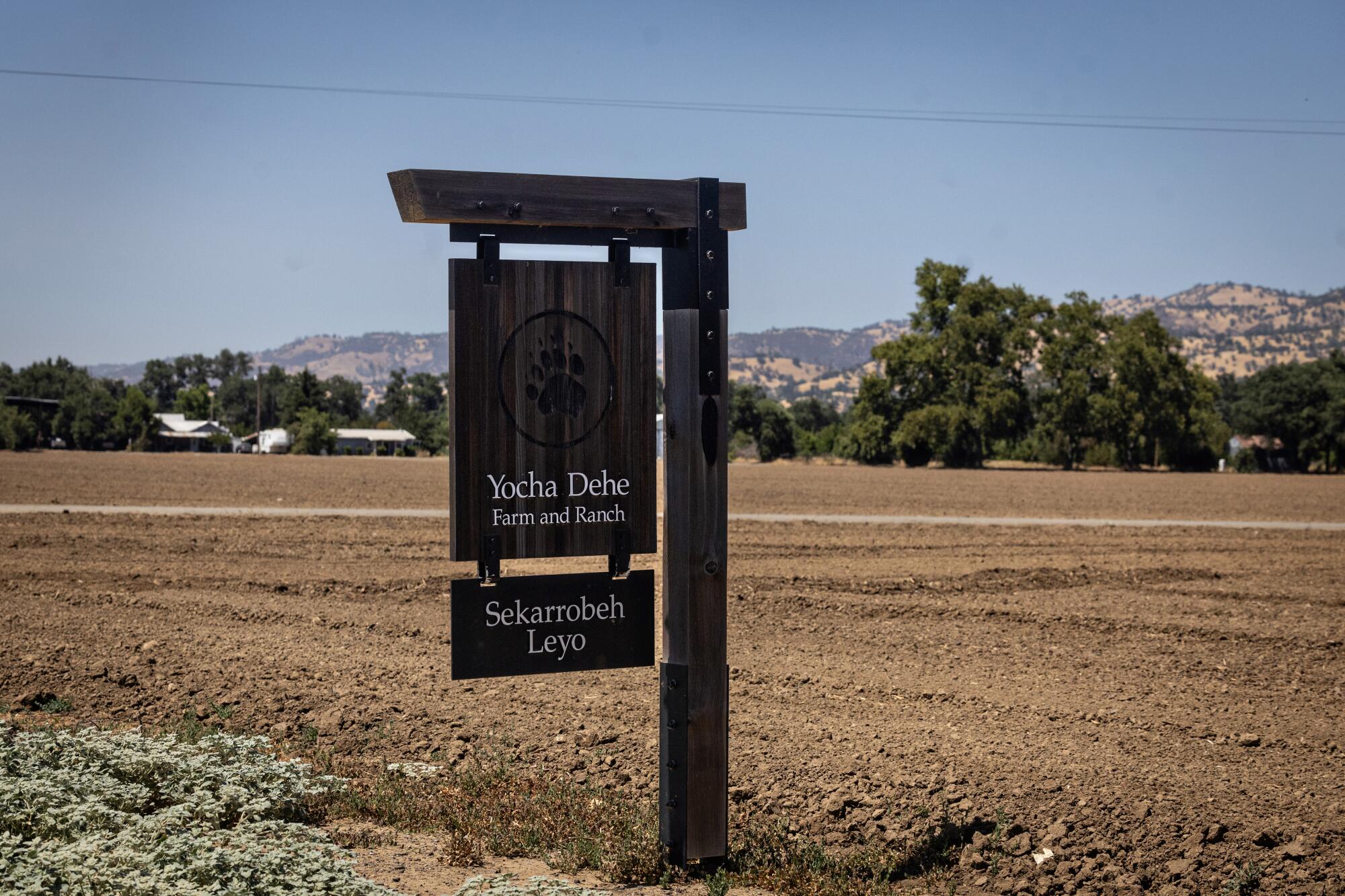
Farmland of the Yocha Dehe Wintun Nation in Brooks, Calif.
(Jason Armond/Los Angeles Times)
A spokesman from the Bureau of Indian Affairs assistant secretary’s office said the agency had no further comment about the project beyond the one-page email it sent The Times confirming that the 30-day public comment period for an environmental impact review is underway.
Yocha Dehe Tribal Treasurer Leland Kinter, 48, said his biggest regret, besides what he sees as an air of secrecy around the project, is that his tribe and the leaders of the Scotts Valley tribe have not had meaningful contact in years because of the dispute.
To show solidarity, he said, the Yocha Dehe nation once offered financial assistance to the Scotts Valley tribe if they agreed to build on a more culturally appropriate site.
“We have not talked to them since that time,” Kinter said.
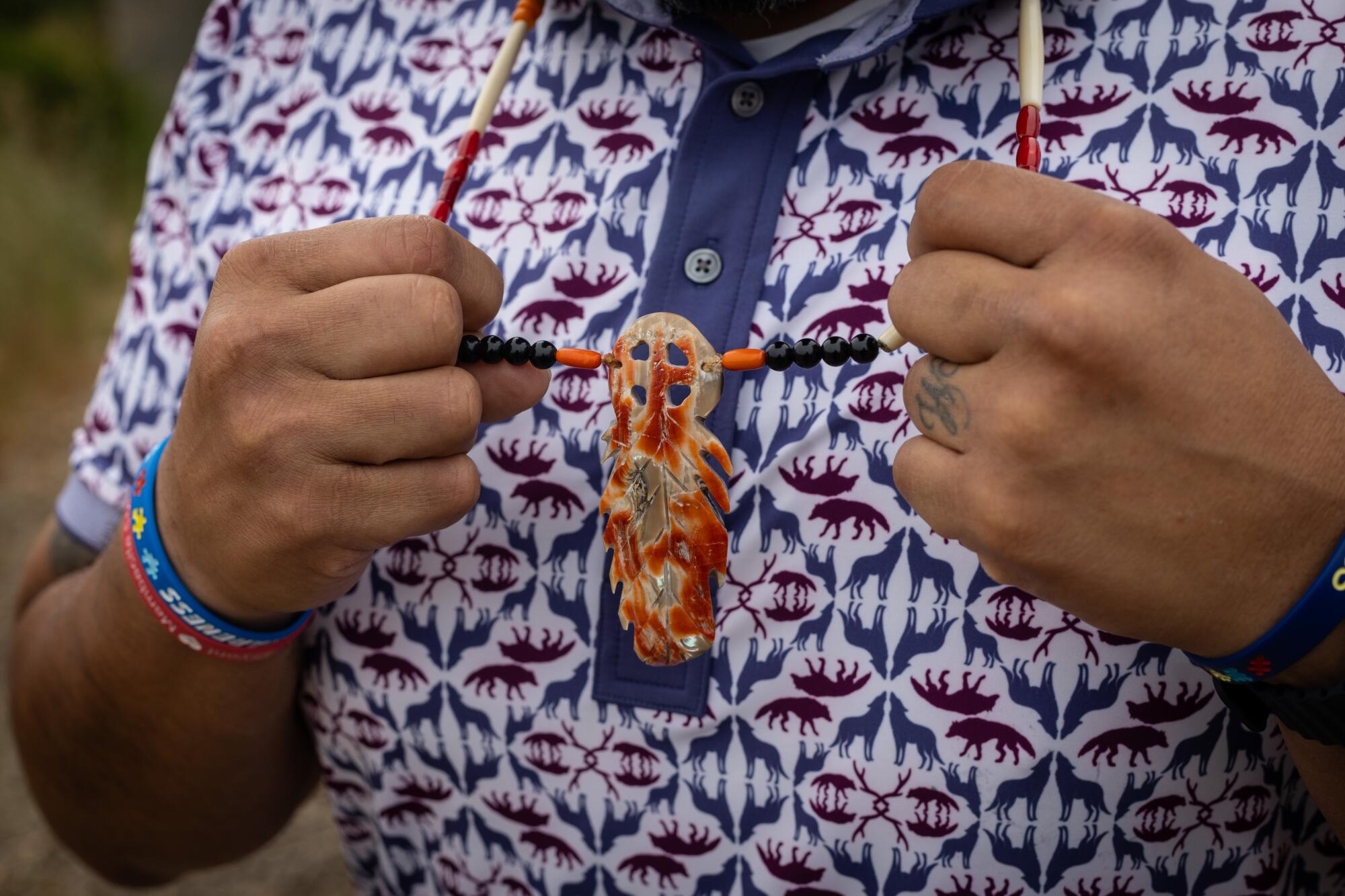
Anthony Roberts, tribal chairman of the Yocha Dehe Wintun Nation, wears Indigenous jewelry made of abalone shell.
(Jason Armond/Los Angeles Times)
On a recent morning, Roberts and Kinter surveyed the proposed casino site from a parking lot by the junction of Interstate 80 and California 37.
Craggy outcroppings rise from the golden slopes and oak groves of a hill where cows graze on a solitary ranch. Grooves in the hillside squiggle down toward a pasture and bike path at its base.
Kinter and Roberts said the indentations are streambeds that their Patwin ancestors committed to memory for when they needed water. Tribe messengers, known as runners, would have spent their days sprinting over hills and ridges like these from one village to another, they said, while miners would have quarried rock from the hill to make stone mortars and other tools.
Roberts, 52, can’t see how such a massive development wouldn’t desecrate what is to his people a sacred and historically rich locale. And he wonders how the project appears to be moving forward with limited input from his tribe or the general public.
The Solano County Board of Supervisors, members of California’s congressional delegation and other leaders have also voiced opposition to the Scotts Valley Band’s attempts to build a casino in the area over the years.
U.S. District Court Judge Amy Berman Jackson wrote in her opinion supporting the Scotts Valley Band that the whole reason for the Indian gaming law is to give dispossessed tribes “some semblance of the status they enjoyed before, with the opportunity to sustain themselves economically.”
But the Yocha Dehe leaders question why Scotts Valley has sought to use a special provision in the law that allows a federally recognized tribe to construct a casino outside its traditional home base — provided it can show both a modern-day link and a “significant” historical connection to the parcel it wants to build on.
Roberts said Scotts Valley cannot meet that threshold.
The Yocha Dehe’s ancient connection to Solano County is evident in many ways, Roberts said. The tribe has been involved in efforts across the North Bay to identify and properly handle Patwin burial grounds, human remains, ancient relics and mounds where ancestors who lived near the shoreline piled their discarded mollusk shells.
The men said they are certain that the casino parcel contains unearthed cultural items too.
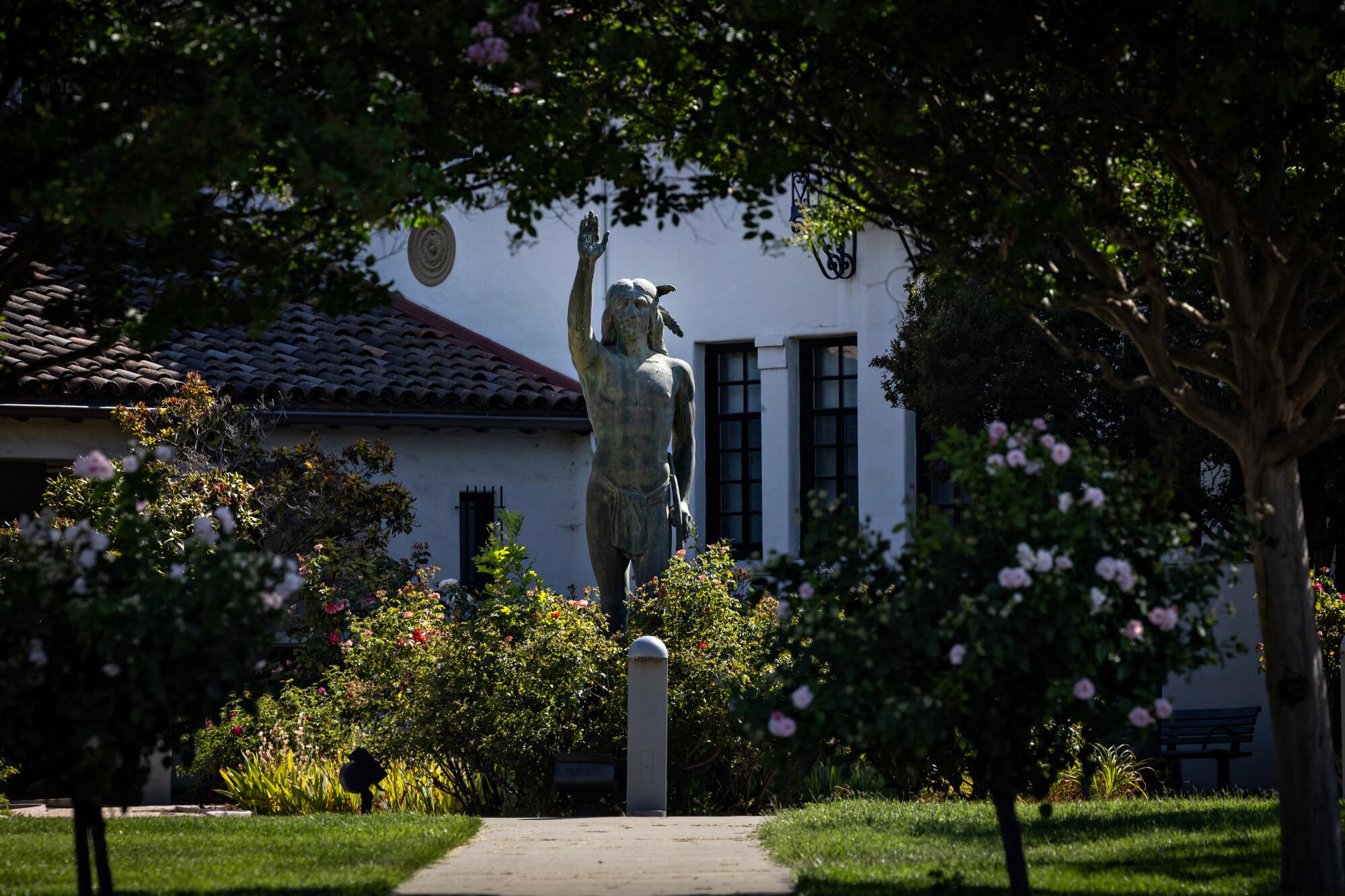
Near the Solano County Superior Court in Fairfield stands a statue of Chief Solano a leader of the Suisunes, a Patwin people of the Suisun Bay region of Northern California.
(Jason Armond/Los Angeles Times)
The county’s namesake is Patwin Suisun leader Sem-Yeto, who was given the name of the Spanish missionary Francisco Solano at his baptism. A 12-foot statue of Chief Solano raising his hand stands outside an events center in the county seat of Fairfield. Several towns in the county are phonetically tied to Patwin villages — Suisun, Soscol, Ulatis and Putah — according to the county’s official homepage.
The tribe recently led an effort with the Solano Land Trust to change the name of 1,500-acre Rockville Hills Regional Park to Patwino Worrtla Kodoi Dihi — meaning “Southern Rock Home of the Patwin people.”
For Roberts, the casino dispute is about more than Indian gaming rights and capitalism. Yocha Dehe operates its own successful casino, golf resort and large-scale farm farther north in the Capay Valley, near the city of Brooks.
It’s about the ability of a people to assert their culture and influence in a state where Indigenous societies were once at risk of erasure.
The casino disagreement comes as landless tribes and tribes on reservations make strides toward reclaiming and co-managing stolen territory in California.
Oakland’s Indigenous-woman-led Sogorea Te’ Land Trust and members of the Confederated Villages of Lisjan Nation recently held a celebration to mark their preservation of a 2.2-acre sacred site known as the West Berkeley Shellmound.
On the fifth anniversary of his apology to Indigenous Californians for the injustices they’ve endured, Gov. Gavin Newsom recently announced the state would help the Shasta Indian Nation reclaim 2,800 acres of its ancestral land as part of historic Klamath River dam and reservoir removals near the border with Oregon.
The Yocha Dehe tribe’s advocacy helped to secure the recent expansion of Berryessa Snow Mountain National Monument by President Biden and the renaming of a sacred mountain within the monument to Molok Luyuk — Patwin for “Condor Ridge” — in honor of the endangered bird’s importance in tribal beliefs.
Gonzalez says his tribe’s presence in the area is also well documented, and his ancestors ceded the land in an unratified 1851 treaty.
“The United States sought this land from our ancestors because of their long-standing presence and use of the area,” Gonzalez said. “In fact, the federal government acknowledged and determined that Scotts Valley’s ancestors possessed the authority to cede the land.”
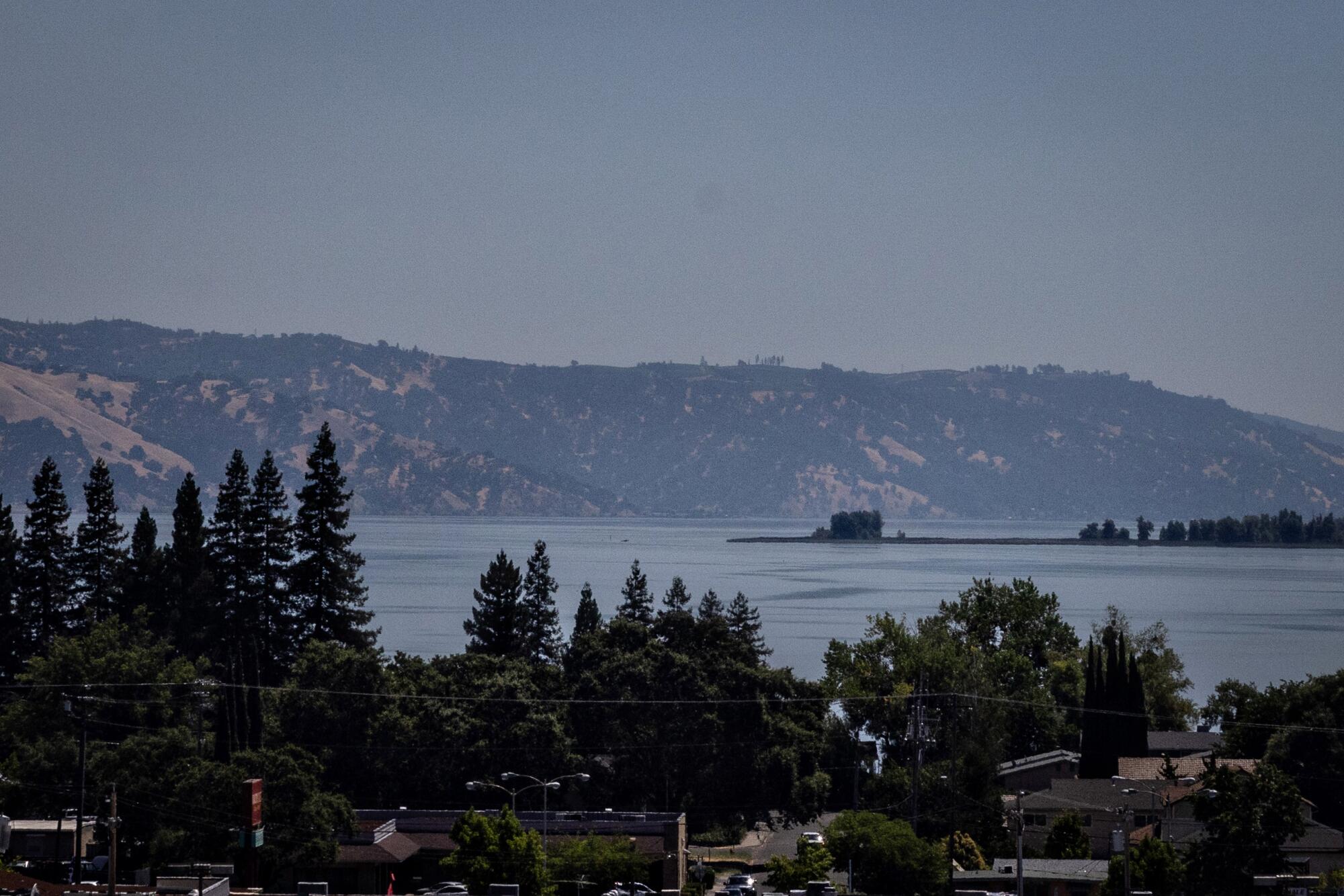
A view of Clear Lake.
(Jason Armond/Los Angeles Times)
The Scotts Valley Band of Pomo Indians headquarters is located to the west of Patwin territory in Lake County, near where one of the most horrific acts of violence committed against Indigenous people in U.S. history took place.
On Reclamation Road, a small historical marker beside Clear Lake recalls the Bloody Island Massacre at Bo-no-po-ti. On May 15, 1850, the U.S. Cavalry, aided by vigilantes, murdered scores of Pomo people, most of them women and children, on the false suspicion that they were involved in the killing of two white settlers.
Such aggressions forced Pomos to disperse far from the lake, including to the North Bay.
Arguing its case for the casino in court documents, Scotts Valley noted that one of the most important ancestors of the present-day band, Chief Augustine, was baptized at a mission a short distance from Vallejo in Sonoma.
Augustine and other displaced Pomos toiled as forced laborers in the area — tending farm animals, herding cattle to slaughter at San Pablo Bay and building adobe houses in Sonoma. Most eventually made their way back to Clear Lake.
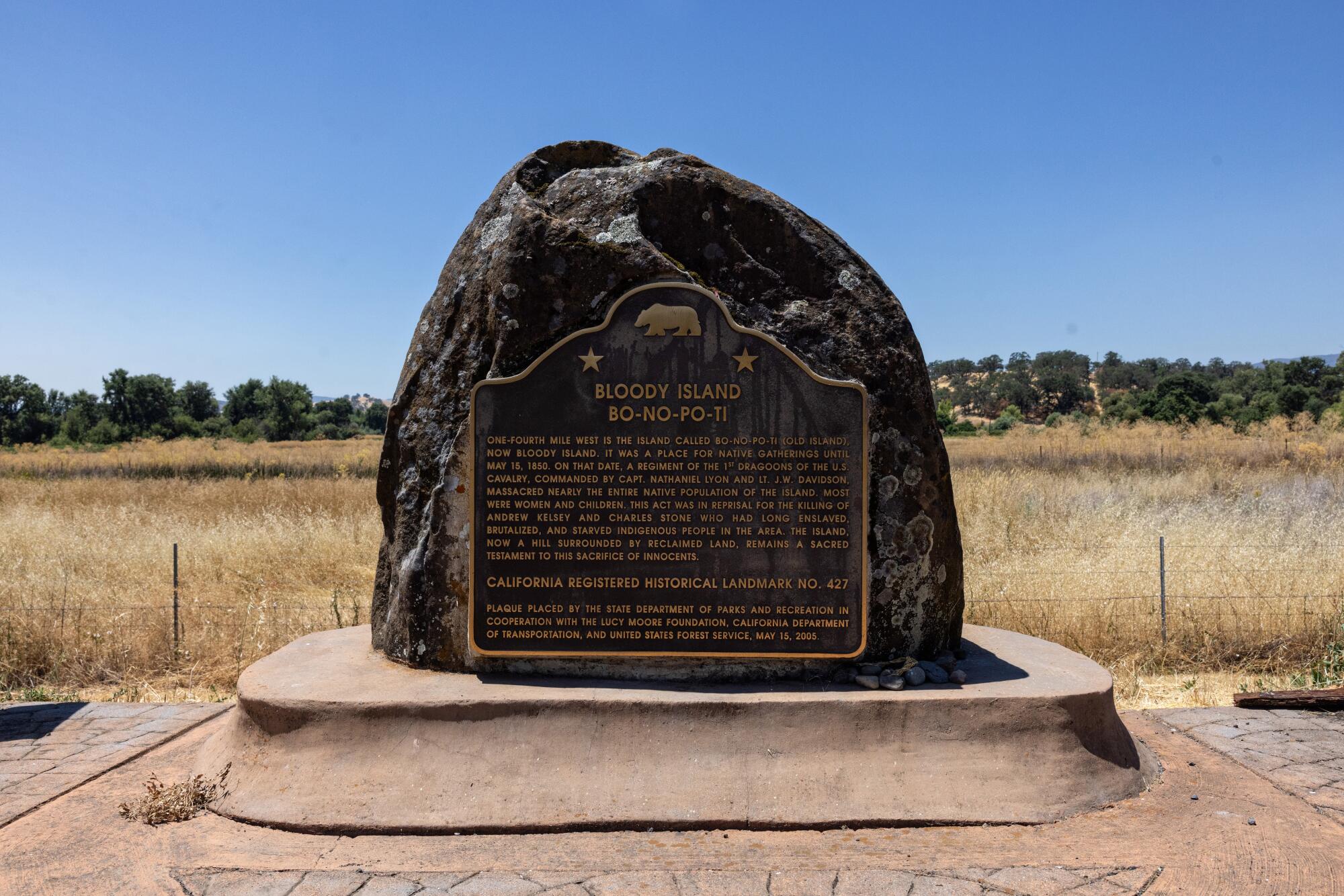
The site of the Bloody Island Massacre, a mass killing of indigenous Californians in 1850 by the U.S. Cavalry at Clear Lake in Lake County.
(Jason Armond/Los Angeles Times)
Both the Pomo and Patwin people suffered further indignities in the 20th century after the U.S. designated small reservations for them, only to reverse course and strip them of those lands and their federally recognized status in the 1950s and ’60s. The tribes had to fight through the courts to win back their federal recognition, a legal status required for lands to be placed in trust for them to build on.
This cycle of governmental theft, recompense and reinjury lives on, the federal judge said in her 2022 ruling.
In rebuffing Scotts Valley, the Trump administration “failed to grapple with the inescapable historical fact that Scotts Valley was a tribe that had its recognition and land stripped away by the federal government and its people scattered to the winds,” Berman Jackson wrote.
Roberts and Kinter don’t dispute that the Scotts Valley Pomo people deserve justice for the atrocities and land seizures. But while Berman Jackson rejected the idea that the casino would disadvantage the Yocha Dehe, its leaders counter that the casino project represents an instance of the U.S. unfairly infringing on the sovereignty of one tribe in order to atone for injustices committed against another.
“Two wrongs don’t make a right,” they said.
“The Pomo people have their own story that centers around the lake — it’s a very vibrant history,” Kinter said. “The history here is ours.”
















Discussion about this post